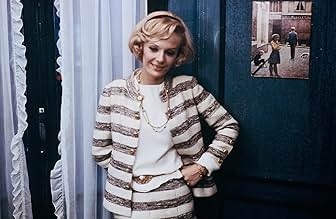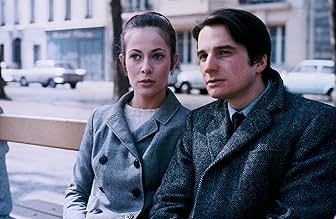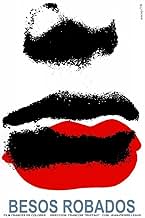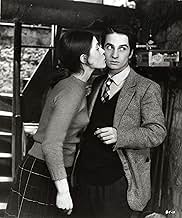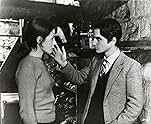Baisers volés
- 1968
- Tous publics
- 1h 31m
After being discharged from the army, Antoine Doinel centers a screwball comedy where he applies for different jobs and tries to make sense of his relationships with women.After being discharged from the army, Antoine Doinel centers a screwball comedy where he applies for different jobs and tries to make sense of his relationships with women.After being discharged from the army, Antoine Doinel centers a screwball comedy where he applies for different jobs and tries to make sense of his relationships with women.
- Nominated for 1 Oscar
- 5 wins & 7 nominations total
- Georges Tabard
- (as Michel Lonsdale)
- Albani
- (as Simono)
- Albert Tazzi
- (uncredited)
Featured reviews
"Baisers Volés" is a delightful romantic comedy of François Truffault. Using his alter-ego, Antoine Doinel, this movie pictures the romantic and very funny adventures of this character in Paris with prostitutes, with his girlfriend and with his married passion. The soundtrack, with song "Que reste-t-il de nos amours?" of Léo Chauliac, is simply wonderful. This classic story is still charming and not dated almost forty years later. My vote is eight.
Title (Brazil): "Beijos Roubados" ("Stolen Kisses")
Standing by itself, Stolen Kisses is a terrific film about a mediocrity. Antoine can't hold a job, and he can't even hold a woman. He kisses his girlfriend as he would kiss a prostitute - awkward and rough. Upon meeting a private detective (modeled after Andre Bazin - Truffaut's mentor), Antoine gets a job spying on the workers of a shoe store owner who claims everyone hates him. There, he falls into lust with the bosses high-society wife.
At the end of the film, Antoine is forced to compromise and marry his old girlfriend for whom he may or may not feel any true love. The point is that she is there to support him and love him. He is the elevated statue of desire to her just as the shoe store owner's wife was to him.
All in all, this movie is exceedingly well done by the Great Truffaut, but I just couldn't get past the fact that Antoine was the same boy I last saw escaping from a juvenille hall and running to the ocean in a moment of personal victory from a society that didn't really want him. Something in this film did not match up with the previous one.
Stolen Kisses would be an interesting departure for Truffaut, as it would represent a deviation from the tightly worked scripts he had used up to that point. After two highly structured screenplays in a row, Truffaut sought a more improvisational take on small events inspired by his own life including his visits to brothels and the end of his military service. The structure of the film was looser than Truffaut had ever used before, but he was more concentrated on who he wanted Antoine Doinel to be. Up until this point, Doinel represented Truffaut almost entirely, in Stolen Kisses though, Truffaut wanted Doinel to be 50% Truffaut and 50% Jean-Pierre Léaud. Jean-Pierre Léaud had brought to the role his unique spirit, expertly bringing Doinel to life in his previous films in the Doinel series, and Truffaut wanted to insert even more of Léaud into the character of Doinel. Inspired by Honoré de Balzac's The Lily of the Valley and a song by a favorite musician, Charles Trenet (Stolen Kisses) Truffaut attempted to create a blend of his own persona and that of the young man he had developed a mentor-like relationship with, collaborator Jean-Pierre Léaud.
Still drawing heavily from his own life, Truffaut began Stolen Kisses with Antoine Doinel being discharged from the military similar to the way Truffaut was discharged. Truffaut was completely humiliated while facing his superiors, each of them knowing he was only being discharged due to Andre Bazin's influence, and although he was desperate to leave the military, he surely could have done without being talked down to in such a way. Being shot with an almost entirely new crew, Stolen Kisses would mark a new endeavor for Truffaut, perhaps that is the reason there was so much nostalgia drizzled throughout the film. Drawing inspiration from Lubitsch and Renoir, Truffaut made a light and comical, yet touching, continuation of Antoine Doinel. Being inspired by a full page ad for a detective agency, which he incorporated into the film as a means for Antoine to discover his new career, Truffaut decided to have Doinel explore the career of a private eye. Truffaut even collaborated with a private eye throughout filming for added realism. Whimsical music opened Stolen Kisses setting the stage for a more lighthearted tone than was present in Antoine and Colette, and certainly, The 400 Blows. In addition to the music being more light and playful, the acting was also much more physical and comedic than I had previously seen in a Truffaut film. Exaggerated gestures and gags reminiscent of silent film canon gave Stolen Kisses a relaxed, yet experimental feel. The rapid cuts and innovative editing techniques proved Truffaut was staying true to the movement he had ushered in.
Even in the lighthearted and comedic moments of Stolen Kisses, it was obvious that Antoine was still searching, desperate to fill an obvious void in his life. Antoine was repeatedly trying with incredible diligence to be accepted into Christine's (Claude Jade) family. Antoine was more intent on being accepted into Christine's family than he was on being accepted by Christine. In one of the dinners that Antoine shared with Christine's parents, he admitted that he did not have a close relationship with his parents. Sensing his need for familial connection, and understanding of their daughter's uncommitted attitude toward Antoine, the Tabard's, Fabienne (Delphine Seyrig) and Georges (Michael Lonsdale) would nurture Antoine in one way or another. Fabienne would often act motherly toward Antoine, often by encouraging him to eat or address his feelings. Georges, too, would help Antoine by finding him work and teaching him how to dress so as to be taken seriously, especially by prospective employers. The love Antoine received from the Tabard's seemed to be exactly what he was searching for, as he desperately wanted to become part of a family. Romantic love also eluded him, as he was unable to gain the courage necessary to express himself to Christine and be honest with her of his desire to take their friendship to another level. Antoine even struggled with the various prostitutes he would attempt sexual relations with, making it clear that Antoine's longing was for much more than carnal urges. Perpetually lost, we see Antoine's immaturity and longing through the funniest moments in the film. Truffaut expertly shows the emasculation of Antoine bookended with lighthearted comedy in order to better feel the multiplicity of Antoine's pain. Not only does Antoine feel like less of a man because of his difficulties with women sexually, but he also feels like less of a person because of his difficulties with maintaining a job and a relationship. This relates back to Antoine's struggle with his parents and his troubled early life. Antoine has traversed most of his life without someone to guide him and without proper examples of how to grow and foster relationships with people. At this stage of his life, Antoine can be guided, like the Tabard's attempt to guide him, but he will not know what to do at each successive step because he has never seen each step play out. Without a model from which to draw inspiration, Antoine is endlessly meandering throughout existence desperate for someone to take the journey with him and help him learn about life along the way. Love is a driving force for Antoine, he longs for the love in adulthood that he was robbed of through childhood. Antoine seems to possess a romantic conviction that love can overcome the tragedy he has experienced, and by finding someone to love and to love him in return he can change his meandering life into one of purpose. Just as Truffaut struggled to shake his own regretful childhood and to develop the strength to give himself in friendships, love, and cinema, we see Antoine attempt to withstand his upbringing by learning how to develop relationships and navigate the working world, a struggle not unknown to any of us.
An often hilarious continuation of Antoine Doinel's life, leaves you reflecting on similar scenarios in your own formative years. Great performances and great direction.
As Christine, Claude Jade is as cute as a button and her scenes are often the most charming ones in the film. Her introductory scene, stepping out of the Parisian night appearing like an angel to wave shyly at Antoine through a glass wall, is a delight. Later, Christine attempts to guess Antoine's latest job, amusingly tossing out way-off-the-mark guesses like cab driver or water taster. It is a ticklish scene but also hints that Christine, as of yet, doesn't think so highly of Antoine's employable skills. By the film's end, Antoine has become a TV repairman. He has been holding a grudge against Christine, so she wins him back in a fetching manner. She calls his company for service even as she is removing a component from her TV. The company sends Antoine, who is then forced to stay for hours trying to fix an irreparable TV.
The best romantic scene in the film, however, is a quaint breakfast scene one morning in Christine's kitchen. Christine is busy teaching Antoine how to butter toast. Antoine, for his part, wishes to pose a question to her. Too embarrassed to express himself in words, he writes his question on a notepad instead and hands it to her. She immediately writes her reply and hands it back to him. They continue in this manner for a few more exchanges before Antoine withdraws a scissor from a nearby drawer and hangs it on Christine's ring finger. It is a touching and intimate moment between the two young lovers and communicates, without intrusive words, their affection for one another.
Did you know
- TriviaThe original French title of the film comes from a line in Charles Trenet's song "Que reste-t-il de nos amours?" which is also used as the film's signature tune.
- GoofsWhen talking with Madame Carbon, Antoine is preparing a piece of cheese with mustard, but after the cut to a different angle, he is holding his glass of wine instead.
- Quotes
Georges Tabard: Do you speak English, Antoine?
Antoine Doinel: I'm learning from records, but it's not easy.
Georges Tabard: Records are a joke. There's only one way to learn: in bed with an English girl. It's time you learned. I learned with an Australian girl while her husband was at work painting houses.
Fabienne Tabard: Like Hitler.
Georges Tabard: Don't ever say Hitler was a housepainter. That's slander. Hitler painted landscapes.
- Crazy creditsInstead of including "The lily in the valley" by Honoré de Balzac in the writing credits, François Truffaut shows the main character reading a book with a cover that says '"The lily in the valley" by Honoré de Balzac'.
- ConnectionsFeatured in Introduction to Truffaut Season (1972)
- SoundtracksQue Reste-t-il de nos Amours ?
Music by Charles Trenet and Léo Chauliac
Lyrics by Charles Trenet
Performed by Charles Trenet
- How long is Stolen Kisses?Powered by Alexa
Details
- Release date
- Country of origin
- Official site
- Languages
- Also known as
- Stolen Kisses
- Filming locations
- 15 Rue de Steinkerque, Paris 18, Paris, France(exteriors: Antoine's apartment facing Sacré Coeur)
- Production companies
- See more company credits at IMDbPro
Box office
- Budget
- $350,000 (estimated)
- Gross US & Canada
- $509
- Opening weekend US & Canada
- $11,206
- Apr 25, 1999
- Gross worldwide
- $509
- Runtime1 hour 31 minutes
- Sound mix
- Aspect ratio
- 1.66 : 1
Contribute to this page


![Watch Bande-annonce [OV]](https://m.media-amazon.com/images/M/MV5BMDA4YTUxMjAtMDMwNi00MWY1LTllZTgtZTQzZjRlMjE1NWEwXkEyXkFqcGdeQXRyYW5zY29kZS13b3JrZmxvdw@@._V1_QL75_UX500_CR0)
